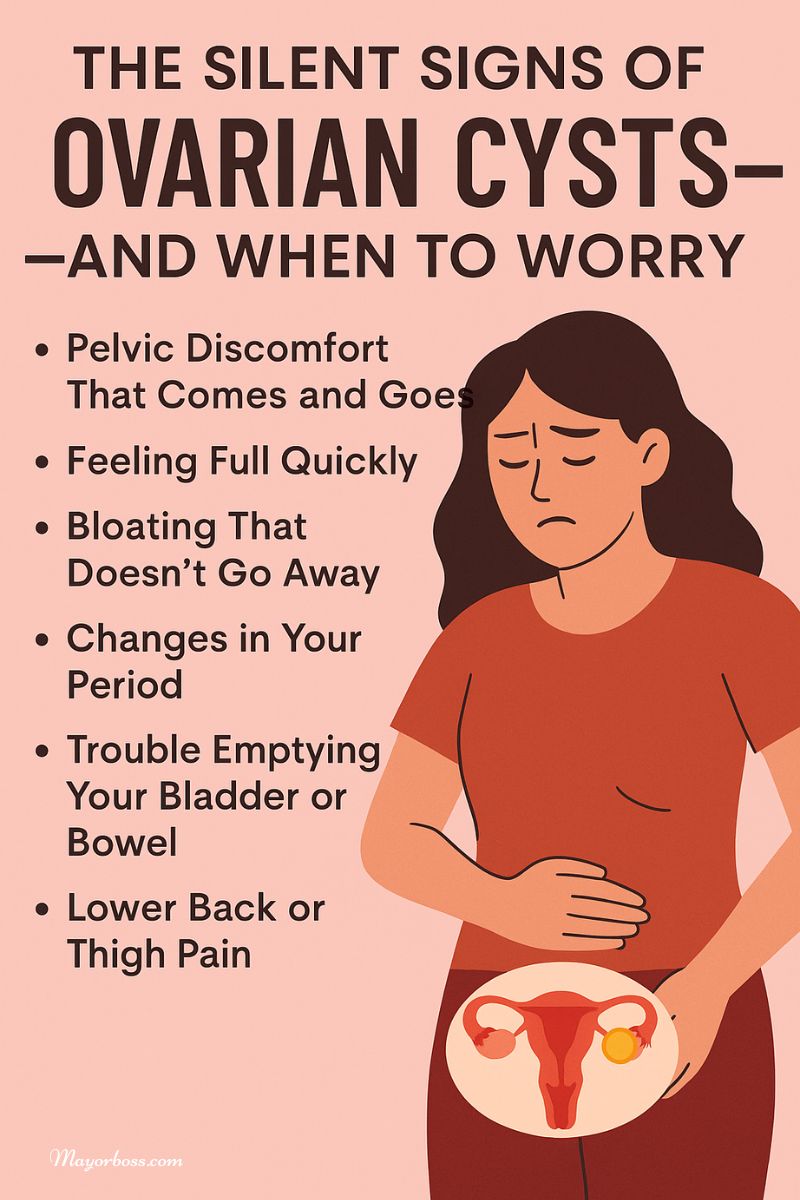The Silent Signs of Ovarian Cysts—and When to Worry
Ovarian cysts are fluid-filled sacs that form on or inside the ovaries.1 Most of the time, they are harmless and go away on their own. But some cysts can grow, cause symptoms, or lead to complications if left untreated. What makes ovarian cysts tricky is that many women have them and don’t even know it.
In this article, we’ll go over the quiet signs you shouldn’t ignore and help you understand when to seek medical help.

What Are Ovarian Cysts?
Ovaries are part of a woman’s reproductive system. They store and release eggs each month during the menstrual cycle. Sometimes, during this process, a small sac of fluid—called a cyst—can develop. This is common and usually part of normal ovulation.2
There are different types of ovarian cysts, but the most common are:
- Functional cysts: These form during your cycle and usually go away within a few weeks.
- Dermoid cysts, cystadenomas, or endometriomas: These are less common and may cause more symptoms or require treatment.
Why They Often Go Unnoticed
Many ovarian cysts don’t cause symptoms. You might have one and feel perfectly fine. They’re often discovered during a routine pelvic exam or imaging test for another issue.
But sometimes, the body sends out signals—quiet ones. And recognizing them early can prevent future problems.
Silent Signs of Ovarian Cysts You Shouldn’t Ignore
1. Pelvic Discomfort That Comes and Goes
A dull or sharp pain in the lower belly, usually on one side, can be a sign.3 It may come and go, and might feel worse during your period or after sex.4 Many women mistake it for regular cramps or ovulation pain.
2. Feeling Full Quickly
If you feel full even after eating a small amount or notice a sense of pressure in your lower belly, it could be from a growing cyst pressing on nearby organs.
3. Bloating That Doesn’t Go Away
Ongoing bloating or swelling in the lower abdomen may be a sign of a larger cyst. Unlike normal bloating that comes and goes, this tends to stick around.
4. Changes in Your Period
You might notice your periods are heavier, lighter, or more painful than usual. Irregular cycles can also point to hormonal imbalance linked to certain cysts, such as those in polycystic ovary syndrome (PCOS).
5. Trouble Emptying Your Bladder or Bowel
A cyst can push on the bladder or bowel, making it harder to urinate or pass stool. You may feel like you have to go more often or feel pressure that doesn’t go away.
6. Lower Back or Thigh Pain
Some women feel aching pain in the lower back or thighs. This usually happens when a cyst becomes larger and puts pressure on nearby nerves.
When to Worry
While most cysts are harmless, there are times when you need to act quickly. See a doctor right away if you have:
- Sudden, sharp pelvic pain
- Pain with fever and vomiting
- Rapid breathing or weakness
- Dizziness or fainting
- A feeling like something has “burst” inside you
These may be signs of a ruptured cyst or ovarian torsion, which is when the ovary twists around itself. These are medical emergencies and need quick treatment.
What Increases Your Risk?
Certain factors can raise your chances of developing ovarian cysts:
- Hormonal imbalances
- Pregnancy (some cysts form early in pregnancy)
- Endometriosis
- History of ovarian cysts
- Polycystic ovary syndrome (PCOS)
How Are They Diagnosed?
If you have symptoms, your doctor may do a pelvic exam and order an ultrasound to check your ovaries. Other tests, like blood work or hormone checks, may also help find the cause.
Treatment Options
Most ovarian cysts go away on their own without treatment. But if a cyst is large, painful, or doesn’t go away after a few months, treatment may be needed.
Common treatments include:
- Watchful waiting: Your doctor monitors the cyst with follow-up ultrasounds.
- Hormonal birth control: To help prevent future cysts.
- Surgery: If the cyst is large, causing pain, or looks suspicious.
Final Thoughts
Ovarian cysts are very common, and in most cases, they’re not a reason to worry. But listening to your body is important. If something doesn’t feel right, don’t ignore it. Silent signs like unusual bloating, pelvic pressure, or changes in your cycle may be your body’s quiet way of asking for help.
When in doubt, check it out.
